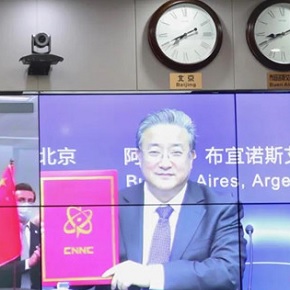 |
||
|
Kudankulam: AFR controversy continues AtomInfo.Ru, PUBLISHED 21.02.2022 The conflict over the proposed dry storage facilities for spent nuclear fuel from the Kudankulam nuclear power plant (India) has reached a new level. The local authorities, who oppose the storage facilities, are calling for the central government to join the discussion and either return the spent nuclear fuel to Russia or place it in a permanent geological storage facility, which, by the way, is not available in India. Recall that in 1998, when signing an agreement with Russia on the construction of the Kudankulam nuclear power plant, the Indian side insisted that the spent nuclear fuel would remain in India for processing. Prior to being sent for reprocessing, the plant's irradiated fuel is stored in spent fuel pools, from where it is planned to be moved to temporary AFR dry storage facilities, containers for which will be supplied by the US company Holtec. But the dry storage plans are opposed by local activists and politicians. The conflict reached a new level after the involvement of the Chief Minister of Tamil Nadu, M. K. Stalin, in the discussion. The politician sent a written request to Indian Prime Minister Narendra Modi, in which he outlined his position. According to Stalin, the dry storage facilities that are going to be built for each of the station's queues can pose a danger to the environment and the population. "I request that in the interest of public safety, health and welfare of the people of Tamil Nadu, action may be taken to take the SNF back to Russia. This must not only be for Unit 1 and Unit 2 but also for the subsequent four units. In case this is not a feasible option, the spent fuel may be permanently stored in a Deep Geological Repository in an uninhabited and ecologically non-sensitive area," Stalin believes. Stalin's opinion is also supported by his predecessor as Chief Minister O. Panneerselvam. He recalls that the electricity generated at the Kudankulam nuclear power plant is consumed not only by Tamil Nadu, but by at least four other Indian states. Therefore, the politician believes, it will be unfair if the responsibility for storage of spent nuclear fuel falls solely on the shoulders of Tamil Nadu. The concern of local politicians is related to the assumption that the dry storage, which is interpreted as an interim solution, may de facto turn into a permanent storage facility for spent nuclear fuel. Soothing statements are heard from the central government. In India, a course has been adopted to close the nuclear fuel cycle, so the Kudankulam SNF will be surely processed, and the volumes of waste from processing will be so small that it will not be necessary to build a geological storage for it. The problem is that in the responses from Delhi, there are no specific dates for the start of processing. and so the dry storage controversy continues. Topics: Spent Fuel, Asia, India, NPP Koodankulam Other news: ROSATOM presents full Small Modular Reactors product line at EXPO 2020 Small Modular Reactors Day was an international platform for discussing the benefits of SMR. 19 CNNC nuclear power units anticipated to achieve full marks on WANO composite index Average index reaching a record high of 99.51. The second Chinese HTGR came out for first criticality The Shidao Bay-1 unit consists of two HTR-PM reactors combined with a common 211 MWe turbine. |
Hero of the day 
Atucha III Nuclear Power Plant Project Joint Statement The signing of the EPC Contract will be followed by the compliance of all the precedent conditions stipulated therein, among which the need to obtain the corresponding authorizations from the relevant authorities of both countries stands out, together with the financial and technology transfer agreements. INTERVIEW
Vladimir Kriventsev OPINION
Victor Murogov |

